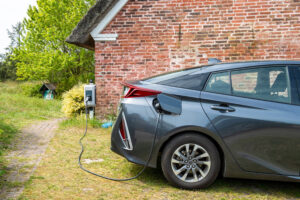The Government risks a £30bn-plus yearly black hole in its tax policy, if it fails to find a meaningful alternative to fuel duty during the transition to electric vehicles (EVs), warned environmental think tank Green Alliance.
It has called for Downing Street to come up with plans to fill the revenue gap as EVs move into the mainstream market, such as road user charging and carbon levies.
Green Alliance said: “A tax roadmap for net zero should prepare the ground for Government action to address these fiscal realities. This is most urgent in the case of fuel duty, which currently raises £30bn a year and will rapidly diminish as the nation’s car fleet electrifies.
“Tackling this early with plans to fill the gap left by fuel taxes, for instance through road user charging, will make implementation less politically challenging.”
In its latest report on taxes and green energy, Green Alliance warned the UK’s tax system remains geared towards a high carbon economy.
It cited data from the Office for Budget Responsibility, which showed it risked the equivalent sum of a 1.6 per cent GDP hit to its economy in 2025/26 over the next three decades from decarbonisation.
This does not include losses of revenue caused by the contraction of North Sea oil and gas.
Currently, fuel duty raises £33.6bn per year from fuel duty, but this is expected to decline as EV sales rise.
The Government is targeting the end of sales for all new petrol and diesel cars by the end of the decade, making the question of replacing fuel duty even more urgent.
Alongside its concerns over fuel duty, the think tank also called for the Government to introduce a sector-by-sector breakdown of how future tax policies will support the net zero transition.
This should include a net zero test for all new tax measures and tax changes to ensure they have, at minimum, a neutral effect on decarbonisation and the natural environment.
Green Alliance also suggested the tax roadmap should feature plans over carbon pricing and provide areas for flexibility in the plans to grapple with any headwinds or challenges over the coming decades.
This would enable the Government to calculate revenue shortfalls from taxes that will decline during decarbonisation of the economy, while using tax to support different sectors and departments to meet net zero.
Green Alliance said: “A tax system adjusted for the new economic circumstances would encourage sustainable behaviours and maintain a stable income for the public purse.
“We recommend the Chancellor publishes a tax roadmap clarifying how the tax system will support, and be adapted for, a low carbon economy.”
Its call for a green tax roadmap follows similar proposals from the Confederation of British Industry, the Institute for Government and the Chartered Institute of Taxation in recent months.
Read more:
Government risks £30bn financial black hole without net zero roadmap


























